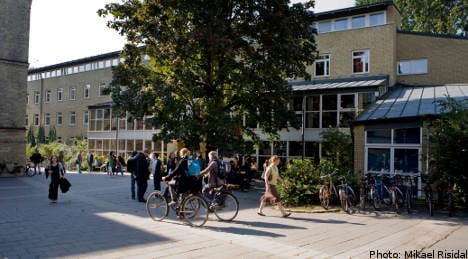A total of 78,100 first-time students began university studies in the autumn, 2 percent less than last year, according to a statement from the Swedish National Agency for Higher Education (Högskoleverket, HSV) on Wednesday.
“What we see is that the new Swedish entrants are fewer this autumn than in 2009. We think it is because last year was an extreme year, probably due to the very bad economy and bad labour market for young people. We see there are far fewer Swedes going to university now,” Ellen Almgren of the HSV told The Local on Wednesday.
Although the number of first-time Swedish students declined to 58,700, the number of new students from other countries actually increased, meaning the number of new Swedish students fell 6 percent.
Before the autumn semester, 120,000 applicants with no previous university education applied for post-secondary schooling, a decrease of one percent from 2009. Overall, however, the number of applicants increased by 4 percent and reached the highest-ever recorded level of 374,000.
The proportion of incoming first-time university students has increased to one-quarter this year from one-fifth in 2009. The proportion of new students who are 19 years or younger increased by 1 percent to 32 percent even though there were more 19-year-olds graduating from secondary school last year.
Whether the increase in foreign students came as a result of the pending introduction of tuition fees remains to be seen, she added.
“The increase is not extremely large, but there is an increase. Of course, this is the last chance for free education. The real effect of the fees won’t be visible until next year,” said Almgren.
While the total number of new students fell in most major professional degree programs, they increased for general degree programmes, especially at the master’s level.
The largest decline in the number of new students came in business administration and social work programmes, which both experienced a decline of 13 percent, and in law, which fell 5 percent.
Almgren pointed out that business administration is a new professional programme that was introduced in 2007 and has increased rapidly both in availability and demand since then, registering a six percent increase in enrollment at one point.
The sole exception to falling enrollment was in specialist nursing and nursing programmes, where the number of new students increased by 9 and 3 percent respectively.
Almgren explained that several universities, including the Karolinska Institute and Uppsala University, lost their rights to provide specialist nursing programmes last year, as well as some of the smaller higher education institutes. These schools subsequently regained their authority to offer these programmes this year.
Although the number of applicants for the autumn semester decreased slightly this year, the number of students applying to the most popular programs remained high. Competition for places in psychology programmes was the fiercest, with almost nine first-choice applicants per place, according to HSV.
Other popular programmes among applicants that are the toughest to get into include veterinary sciences, medicine and architecture, added Almgren.
She warned that the number of young people in Sweden is decreasing on the whole and that the number of 19-year-olds in the country peaked last year, with the figure dropping rapidly.
“It doesn’t explain why the numbers are dropping. Many people are still applying, but the stock is decreasing rapidly in the years to come, so they have to be prepared to some extent for years of decreasing numbers of new entrants,” she said, adding that the schools do not know what to expect with the introduction of tuition fees for foreign students.
However, Denmark experienced a decreasing number of new entrants after introducing tuition fees for international students in 2006, Almgren pointed out.
“It is something they are probably working hard on, how to deal with the resources they have. The organisations are not very flexible. They probably have some problems ahead of them to adapt to a situation where there are fewer entrants,” she said.



 Please whitelist us to continue reading.
Please whitelist us to continue reading.
Member comments